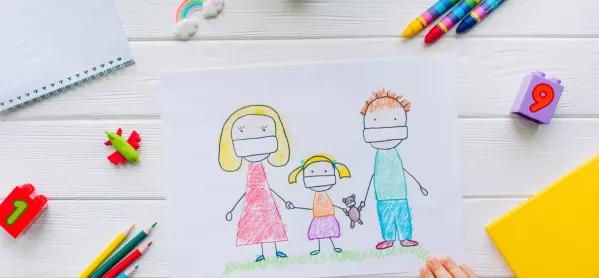- Home
- Covid is stressful for teachers - but also for parents
Covid is stressful for teachers - but also for parents

Achieving the full reopening of schools to all pupils at the start of the new term taxed the resourcefulness and resilience of school leaders and staff.
As Covid cases increase exponentially, and the attendance jigsaw becomes ever more complex, the current challenge is to simultaneously meet the needs of pupils who are in the classroom and those who are self-isolating and learning online. If this sounds like a simple equation to balance, ask any school leader or teacher about the practical difficulties of managing dispersed learners while providing high-quality lessons to those on-site.
Caught in the revolving door of self-isolation, with its juddering stops and starts, parents may feel bewildered. If bringing up a family before 2020 was already arduous, Covid has made the job even tougher.
Coronavirus parenting: Like navigating a minefield
Take Josie, a working mum. She has two children at primary school: six-year-old Keenan and seven-year-old Daisy. They are in different bubble groups, and start school at different times. Josie’s oldest child, Lucas, 11, has started at high school and travels there by bus. If the old normal was a military-style operation to get everyone in the right place at the right time for the day’s work, the new reality feels more like navigating a minefield.
Josie believes fervently in education. Lockdown was tough and she knows that her children have fallen behind, despite doing the work that was set for them. The family looked forward to school starting up again and readjusted to the unforgiving alarm clock. Lucas wore his mask with the same pride as his uniform. And, for a while, all was well.
Four weeks into term, Keenan’s class has to self-isolate for two weeks. The impact is a crashing domino line of fractured domestic arrangements.
Keenan is too young to be left at home alone. He can’t accompany Josie when she walks Daisy to school. Josie doesn’t want to ask her neighbours, because she is worried that they may think the family is infected. And so Daisy, too, stops attending school. (Anyway, Josie reasons, if school isn’t safe for her son, it can’t be safe for her daughter, either.)
Josie can’t work from home, and her worries about the family’s financial future gnaw away at her confidence. Lucas struggles on with life in his new school, and when he doesn’t feel well one morning he decides not to add to his mum’s anxiety and catches the bus as normal: a decision that results in a wave of children being sent home from high school later in the week.
Decisions guided by fear and misunderstanding
This is reality. Parents in areas where there has been a resurgence of Covid - largely areas already beset by deprivation - are making tough decisions, which impact on their families and communities. They want the best for their children and are trying to act upon advice that is sometimes distorted by the white noise of social media.
Some children are attending school when they should not do so. Their parents may be worried about being fined for keeping them at home, so they send them to school even if the child or a member of the household is Covid-positive.
They may be concerned that their children will fall behind if they don’t attend school, so take a chance even if they are possibly symptomatic. For parents who are unable to go to work if their child does not attend school, the problem intensifies.
On the other hand, fear and misunderstanding are guiding the decision-making of some parents who may be keeping their children off school unnecessarily. The fear of Covid haunts families with vulnerable members like a spectre, dwarfing the anxiety about their children losing out on education.
Other parents assume that their child will receive online lessons if they don’t attend, and think, mistakenly, that this is a safer option. Some may be overcautious, and keep their children at home at the first sign of a sniffle. It is easy to see how these concerns emerge, following the World Health Organisation‘s publication of a list of symptoms that may be indicative of Covid-19 in young children.
Difficult choices, every day
The alarming increase in applications for elective home education is an indication of the level of fear and distrust felt by parents who are choosing to opt out of state education altogether, perhaps under the mistaken assumption that opting back in during calmer times will be straightforward.
Removing children from school - for an alternative that may well be more precarious - fuels the myth that schools are hubs of contagion, and threatens to deepen the Covid legacy of social isolation and disenfranchisement.
Some parents have also expressed reluctance to engage with the test and trace regime. An unintended consequence of imposing hefty fines on people who refuse to self-isolate after testing positive for Covid-19 could be that some people are deterred further from getting a test, thus increasing transmission rates.
There are no simple solutions. If Josie had spoken to the headteacher at her children’s primary school, Daisy might still be in class. If Lucas had stayed at home, then a swathe of Year 7 children may have continued learning. Hindsight, as always, is wonderfully illuminating.
Parents ultimately take decisions on behalf of - and in the best interests of - their children. These decisions are difficult, every day. But they are partners in the battle against Covid, who need to be properly and objectively informed.
Hamid Patel CBE is chief executive of Star Academies
Keep reading for just £1 per month
You've reached your limit of free articles this month. Subscribe for £1 per month for three months and get:
- Unlimited access to all Tes magazine content
- Exclusive subscriber-only stories
- Award-winning email newsletters



